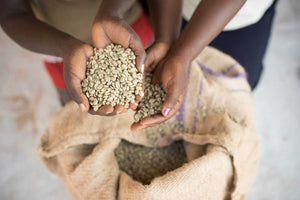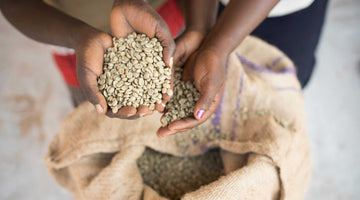This offering from Mountain Harvest offers a clean cup full of butterscotch notes, pineapple acidity, and a soft graham cracker aftertaste.

The Producers
Despite coffee’s importance to the Ugandan economy, coffee farmers are paid poorly and are often vulnerable to a cycle of poverty. Coffee growers do not have the necessary infrastructure, training, or financing to produce high quality coffee. Therefore, farmers are left to distribute their yields to traders at low prices who primarily produce coffee for commodity markets, generating lower incomes for farmers.Mountain Harvest, a social enterprise based in the Mount Elgon region of Uganda, works to raise the quality of life for smallholder Arabica coffee farmers. It’s approach elevates the quality of coffee, disconnects pricing from the commodity markets, and uses the additional margin generated from higher prices to invest at the farm level through an intense, service-oriented engagement with smallholder farmers. Mount Elgon is an untapped origin for the popular Arabica beans, placing Uganda in a position to break into international markets.
 Mountain Harvest supports more than 500 farmers, paying 15-20% above local market prices. The company builds farm and household assets and enhances farmer resilience to shocks on a commercially and environmentally sustainable basis.
Mountain Harvest supports more than 500 farmers, paying 15-20% above local market prices. The company builds farm and household assets and enhances farmer resilience to shocks on a commercially and environmentally sustainable basis.
The Varietal
SL14
SL14 was originally selected in Kenya the late 1930s at the Scott Agricultural Laboratories. Individual tree selections made at the Scott Laboratories in Kenya during the 1935-1939 period were prefixed “SL.” SL14 was selected in 1936 from a single tree labeled Drought Resistant II (D.R. II), and drought tolerance is a noted characteristic of SL14. Historical records documenting the origin of D.R. II were lost, but the seedlings were established at Kabete in 1933, and then widely distributed in areas east of the Rift Valley in Kenya.
Recent genetic tests have confirmed that SL14 is related to the Typica genetic group. It is economically important in both Kenya and Uganda.
Nyasaland
One of the oldest Arabica coffee varieties introduced to Africa. The variety originates from Typica introduced to Nyasland (now Malawi) in 1878 from Jamaica. By 1891 there was a flourishing coffee industry in Malawi, but eventually declined because of the marginal climate, which is hotter and drier than is usual for Typica, and because of the high incidence of pests including white stem borer. Inexperienced farmers allowed the plants to overbear in the first years, causing a precipitous fall in yields that ultimately led to the abandonment of coffee in Malawi.
Nyassaland was taken from Malawi to Uganda in 1910, where farmers also struggled with the variety. Early failure led to the widespread planting of Robusta in Uganda. But in recent years, there has been a small resurgence of Arabica growing on the slopes of Mount Elgon, where Nyasaland (locally called Bugisu) is an important variety for smallholders.






